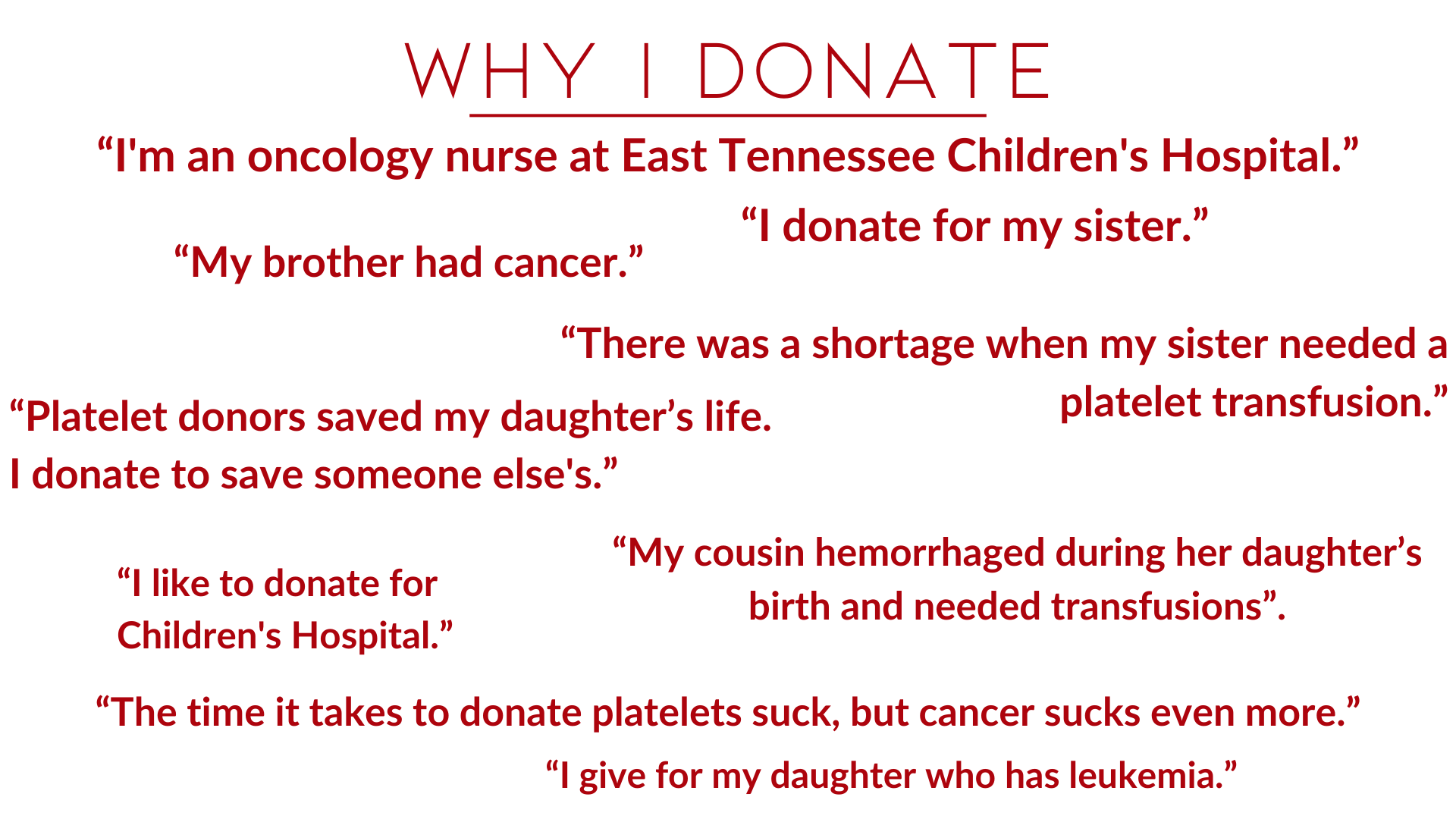Platelet donations are life-saving and not often at the forefront of blood donors’ minds. Most of the general public knows MEDIC as a blood bank. Many donors only know platelet donations exist once someone they know needs the product. Platelet donations are the key to survival or recovery for thousands of patients in the area. With a shelf life of 7 days, platelets don’t last the way whole blood does. It’s essential to raise awareness about the importance of platelet donations and encourage more people to donate. Without platelet donations, many patients’ lives would be at risk. From trauma, cancer, surgeries, and other medical events, platelets are often a critical tool in helping a patient survive. Throughout the spring of 2024, MEDIC will bring you the stories of various families of patients, recipients, and donors of platelet products from our area to share how you, the donor, saved their lives and families.

A Letter From Hospital Services:
Hi! My name is Krissy, and I work in Hospital Services at MEDIC Regional Blood Center. It is the only department at MEDIC that is open 24/7, so we can serve our area hospitals day or night. One of the most significant issues we face is not having enough platelets on hand and in stock for our hospitals to obtain for the people who desperately need them. These people may be cancer patients, those receiving organ or bone marrow transplants, victims of traumatic injuries, and people undergoing open heart surgeries. It is very disheartening and alarming for us in hospital services as well as the staff from our hospitals when they order platelets, and we have to tell them we don’t have any or we have to purchase them from another blood bank, and they won’t arrive for hours. Often, doctors have to cancel scheduled surgeries when we are low or out of platelets. Imagine how that impacts the patient who has been planning for their surgery and now will have to reschedule. Platelets control the bleeding in our bodies. So, they are essential to surviving surgeries. Please consider being a platelet donor. Your precious platelets are desperately needed.
All the best,
Krissy
Jack was diagnosed with infant leukemia at five months old. A constant supply of platelets and blood products saved his life. His parents sat down with us to share his story.
Abbey was diagnosed with aplastic anemia in 2021. Platelet transfusions kept her alive by preventing internal bleeding during her treatment.
Noah beat B-cell acute lymphoblastic leukemia twice, but he couldn’t do it without platelet donations. Learn how platelet donors helped him beat cancer for a second time in 2023.
Mike became a platelet donor after his daughter was diagnosed with aplastic anemia . Platelet donations kept her alive. Years later, he still regularly donates to pay it forward and help others needing platelets.
Two fathers become friends and platelet donors after their daughters are diagnosed with cancer.
Part 2 of John and Larry’s inspiring story.
To learn more about John’s marathon run, visit hope4hattie.com.
Platelets are small cell fragments produced from larger cells called megakaryocytes in the bone marrow. They play a crucial role in the bloodstream in a process called coagulation (blood clotting). When a blood vessel is injured, platelets adhere to the damaged area, cluster together, and release chemical signals that help stop the bleeding.
Doctors may order a platelet transfusion for several reasons. If a patient has a low platelet count, they may be at risk for bleeding, and a platelet transfusion can help increase the platelet count and reduce the risk of bleeding.
Some conditions or medications cause platelet dysfunctions, where the platelets may not work properly, and platelet transfusion can provide functional platelets to help with clotting. There are bleeding disorders that may benefit from platelet transfusions to control bleeding episodes. Bone marrow suppression from chemotherapy or radiation therapy can decrease bone marrow function, leading to low platelet counts. Some surgical procedures (especially those involving the large blood vessels) or traumas that result in significant blood loss may require platelet transfusions to restore adequate blood clotting and reduce the risk of excessive bleeding.
Platelets have a short shelf life primarily due to their nature as cell fragments. They are small, delicate structures that can become activated and start to break down relatively quickly compared to other blood components. There is also a significant risk of bacterial growth during their storage. Platelets are stored at room temperature, providing an ideal bacterial growth environment. Unlike red blood cells, which can be refrigerated for longer periods, platelets must be kept at room temperature to maintain their function. However, this also increases the risk of bacterial contamination during storage. The platelet storage bag has a minimal nutrient supply that is depleted after a short time in storage, further contributing to the short shelf life of platelet units. Due to these factors, platelets have a shelf life of only 5 to 7 days after collection. This short shelf life underscores the importance of efficient inventory management and timely use of platelet units to ensure their optimal effectiveness when transfused to patients in need.
The interval between platelet donations is relatively short compared to whole blood donations because, unlike red blood cells, which take weeks to regenerate, platelets are rapidly produced in the bone marrow. After a platelet donation, the body quickly replenishes the donated platelets, allowing donors to donate more frequently. Also, platelets are often collected using a process called apheresis, which allows specific blood components to be separated and collected while returning the remaining blood components to the donor. This selective collection method enables donors to donate platelets more frequently without experiencing significant depletion of other blood components. While the interval between platelet donations is relatively short, blood centers and health authorities have guidelines in place to ensure donor safety. Donors are screened for eligibility, and donation frequency is monitored to prevent any adverse effects or depletion of essential nutrients.
Letter from a platelet donor:
I know of no topic more complex than human intentionality. In other words, why do people behave the way they do? It would be an impossible herculean task to try to unravel why people do what they do.
I started donating blood while in college. My first donation was on May 8, 1968, when I was 20 years old. I remember getting a small blood-drop-shaped pen for donating that day. I still have that little pen. I have given at least a gallon in five different countries, some of which would be considered third-world countries. The procedure of taking the blood is essentially the same, no matter where it happens.
I have often thought about why I give. Of course, when most people are asked why they donate blood, the answer is “to help others who need blood.” Yes, that is part of why I donate but I will skip that part as it is such a common reason given.
I seem to have a need to achieve. I know, at least in part, that having such a trait is vain of me. Nevertheless, I derive some joy from achievement. When I gave blood in Chattanooga before moving to Knoxville about five years ago, Blood Assurance in Chattanooga would give me a certificate each time I gave another gallon of blood. I proudly display my “39-gallon donation” certificate in my office.
Again, I know it is vain of me, but sometimes I want to toot my own horn and tell people how much blood I have donated. Each year my wife does a newsletter in late December for what we have been doing throughout the year. Last December she mentioned I had joined the 50 gallon club and it made me feel proud.
Another reason I give is that while I am lying on the donation bed, I can goof off. I am now retired, but when I was still teaching, I would put aside my “cares and worries” when I came to donate blood and saw the two hours or so while donating as a time to just relax and read for pleasure. In other words, goof off. Even in retirement, I will bring something interesting to read and just forget about all my responsibilities and duties and just escape and goof off for two hours. When I donated 50 gallons back on May 30, 2023, MEDIC arranged to have me on television. My daughter went on Facebook and said I made it on to television for goofing off!
So, in conclusion, why do I give blood? It is because I am vain and like to goof off. If someone is helped along the way, then that is all the better. (I am being sarcastic here; I hope you know.)
Adney
50+ Gallon Blood Donor

